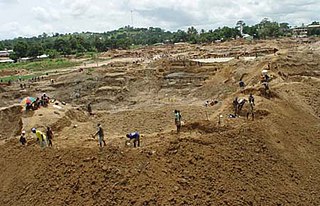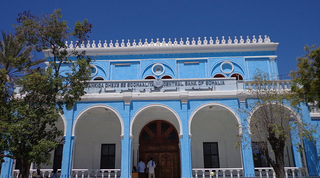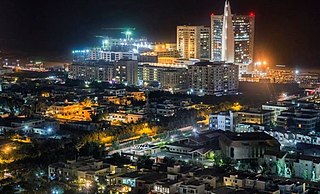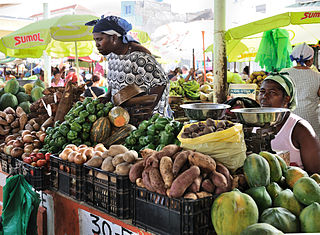The economy of Liberia is extremely underdeveloped, with only $3.222 billion by gross domestic product as of 2019, largely due to the First (1989–1996) and Second Liberian Civil War (1999–2003). Liberia itself is one of the poorest and least developed countries in the world, according to the United Nations.

The economy of Rwanda has undergone rapid industrialisation due to a successful governmental policy. It has a mixed economy. Since the early-2000s, Rwanda has witnessed an economic boom, which improved the living standards of many Rwandans. The Government's progressive visions have been the catalyst for the fast transforming economy. The President of Rwanda, Paul Kagame, has noted his ambition to make Rwanda the "Singapore of Africa". The industrial sector is growing, contributing 16% of GDP in 2012.

The economy of Senegal is driven by mining, construction, tourism, fishing and agriculture, which are the main sources of employment in rural areas, despite abundant natural resources in iron, zircon, gas, gold, phosphates, and numerous oil discoveries recently. Senegal's economy gains most of its foreign exchange from fish, phosphates, groundnuts, tourism, and services. As one of the dominant parts of the economy, the agricultural sector of Senegal is highly vulnerable to environmental conditions, such as variations in rainfall and climate change, and changes in world commodity prices.

The economy of Seychelles is based on fishing, tourism, processing of coconuts and vanilla, coir rope, boat building, printing, furniture and beverages. Agricultural products include cinnamon, sweet potatoes, cassava (tapioca), bananas, poultry and tuna.

Sierra Leone, officially the Republic of Sierra Leone, is a country on the southwest coast of West Africa. It shares its southeastern border with Liberia and is bordered by Guinea to the north. With a land area of 71,740 km2 (27,699 sq mi), Sierra Leone has a tropical climate and with a variety of environments ranging from savannas to rainforests. According to the 2015 census, Sierra Leone has a population of 7,092,113, with Freetown serving as both the capital and largest city. The country is divided into five administrative regions, which are further subdivided into 16 districts.

The economy of Sierra Leone is $4.082 billion by gross domestic product as of 2018. Since the end of the Sierra Leone Civil War in 2002, the economy is gradually recovering with a gross domestic product growth rate between 4 and 7%. In 2008 it in PPP ranked between 147th by World Bank, and 153rd by CIA, largest in the world.

Somalia is classified by the United Nations as a least developed country, with the majority of its population being dependent on agriculture and livestock for their livelihood. The economy of Somalia is $4.918 billion by gross domestic product as of 2020. For 1994, the CIA estimated it at purchasing power parity to be approximately $3.3 billion. In 2001, it was estimated to be $4.1 billion. By 2009, the CIA estimated that it had grown to $5.731 billion, with a projected real growth rate of 2.6%. In 2014, the International Monetary Fund estimated economic activity to have expanded by 3.7% primarily. This expansion was driven by growth in the primary sector and the secondary sector. According to a 2007 British Chambers of Commerce report, the private sector has experienced growth, particularly in the service sector. Unlike the pre-civil war period, when most services and the industrial sector were government-run, there has been substantial, albeit unmeasured, private investment in commercial activities. The investment has been largely financed by the Somali diaspora, and includes trade and marketing, money transfer services, transportation, communications, fishery equipment, airlines, telecommunications, education, health, construction and hotels.

Freetown is the capital and largest city of Sierra Leone. It is a major port city on the Atlantic Ocean and is located in the Western Area of the country. Freetown is Sierra Leone's major urban, economic, financial, cultural, educational and political centre, as it is the seat of the Government of Sierra Leone. The population of Freetown was 1,055,964 at the 2015 census.

The economy of Africa consists of the trade, industry, agriculture, and human resources of the continent. As of 2019, approximately 1.3 billion people were living in 53 countries in Africa. Africa is a resource-rich continent. Recent growth has been due to growth in sales, commodities, services, and manufacturing. West Africa, East Africa, Central Africa and Southern Africa in particular, are expected to reach a combined GDP of $29 trillion by 2050.
The 'Economy of the Caribbean' is varied, but depends heavily on natural resources, agriculture and travel and tourism.

Karachi is the financial and industrial capital of Pakistan. As of 2019, Karachi has an estimated GDP (PPP) of $164 billion. The city accounts about half of the total collections of the Federal Board of Revenue, out of which, approximately half are customs duty and sales tax on imports. Karachi produces about 30 percent of value added in large-scale manufacturing, 25% of the GDP, the World Bank identified Karachi as the most business-friendly city in Pakistan. In 2010, research by the global human resources company Mercer found Karachi to be the most inexpensive city in the world.

The economy of the Middle East is very diverse, with national economies ranging from hydrocarbon-exporting rentiers to centralized socialist economies and free-market economies. The region is best known for oil production and export, which significantly impacts the entire region through the wealth it generates and through labor utilization. In recent years, many of the countries in the region have undertaken efforts to diversify their economies.

The economy of Cape Verde is a service-oriented economy that is focused on commerce, trade, transport and public services. Cape Verde is a small archipelagic nation that lacks resources and has experienced severe droughts. Agriculture is made difficult by lack of rain and is restricted to only four islands for most of the year. Cape Verde's economy has been steadily growing since the late 1990s, and it is now officially considered a country of average development, being only the second African country to have achieved such transition, after Botswana in 1994. Cape Verde has significant cooperation with Portugal at every level of the economy, which has led it to link its currency first to the Portuguese escudo and, in 1999, to the euro.

The economy of Belize is a small, essentially private enterprise economy that is based primarily on agriculture, tourism, and services. The cultivation of newly discovered oil in the town of Spanish Lookout has presented new prospects and problems for this developing nation. Belize's primary exports are citrus, sugar, and bananas. Belize's trade deficit has been growing, mostly as a result of low export prices for sugar and bananas.
The economy of Curaçao is a high income economy, as defined by the World Bank. The island has a well-developed infrastructure with strong tourism and financial services sectors. Shipping, international trade, oil refining, and other activities related to the port of Willemstad also make a significant contribution to the economy.

The mining industry of Sierra Leone accounted for 4.5 percent of the country's GDP in 2007 and minerals made up 79 percent of total export revenue with diamonds accounting for 46 percent of export revenue in 2008. The main minerals mined in Sierra Leone are diamonds, rutile, bauxite, gold, iron and limonite.

Water supply in Sierra Leone is characterized by limited access to safe drinking water. Despite efforts by the government and numerous non-governmental organizations, access has not much improved since the end of the Sierra Leone Civil War in 2002, stagnating at about 50% and even declining in rural areas. In the capital Freetown, taps often run dry. It is hoped that a new dam in Orugu, for which China committed financing in 2009, will alleviate water scarcity.

India–Sierra Leone relations refers to the international relations that exist between India and Sierra Leone. India maintains a High Commission in Freetown. Sierra Leone does not have a resident diplomatic mission in India. The Sierra Leonean embassy in Abu Dhabi, United Arab Emirates is accredited to India.

















